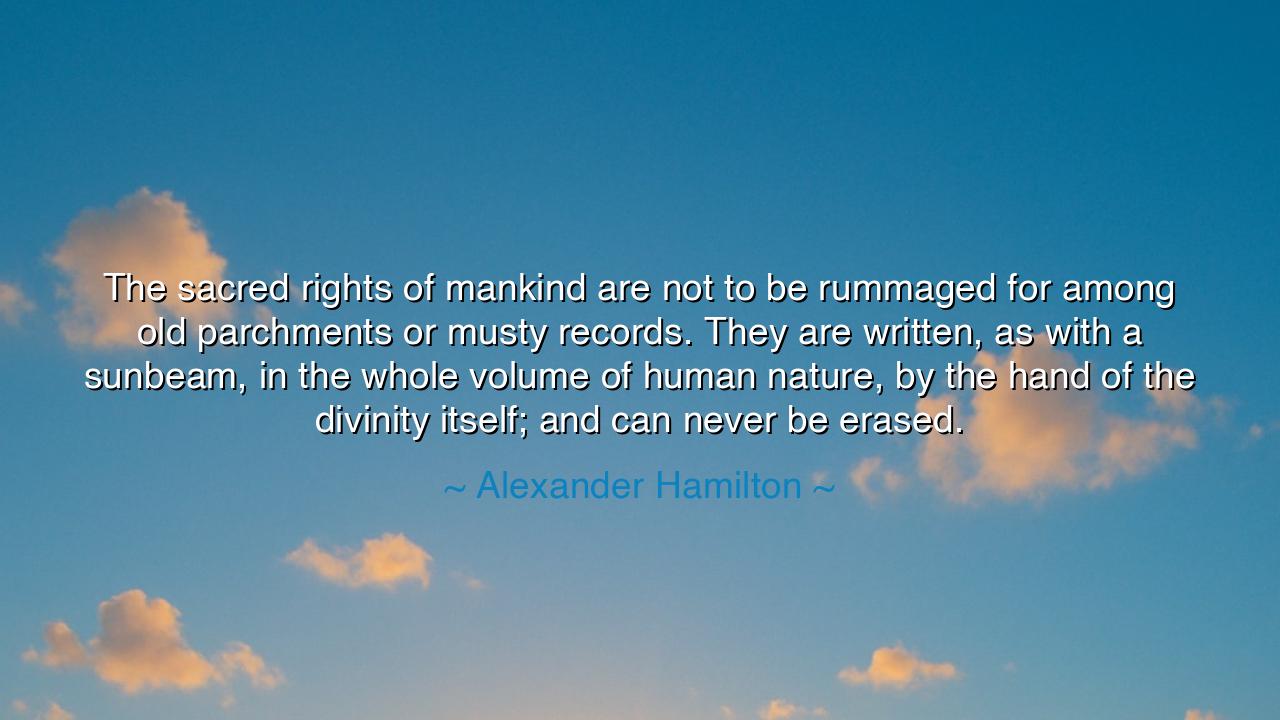
The sacred rights of mankind are not to be rummaged for among
The sacred rights of mankind are not to be rummaged for among old parchments or musty records. They are written, as with a sunbeam, in the whole volume of human nature, by the hand of the divinity itself; and can never be erased.






Alexander Hamilton, fiery architect of the American republic, once proclaimed with immortal clarity: “The sacred rights of mankind are not to be rummaged for among old parchments or musty records. They are written, as with a sunbeam, in the whole volume of human nature, by the hand of the divinity itself; and can never be erased.” In these words, we hear the thunder of conviction and the radiance of vision. He speaks not as a mere lawyer parsing statutes, but as a prophet declaring that human freedom is no invention of man, but a birthright bestowed by heaven itself.
To say that rights are not found in “old parchments” is to dismiss the notion that liberty is the gift of rulers or the artifact of documents. Laws may codify, kings may grant, courts may confirm, but the source of sacred rights lies deeper. Hamilton insists they are inscribed upon the very being of man, as clear and as permanent as the rays of the sun. A parchment may burn, a law may be repealed, but the eternal law written into human nature cannot be destroyed, for it springs from the divinity that formed us.
This truth has echoed through the ages. The Stoics of ancient Rome declared that there exists a lex naturae, a law of nature, higher than the decrees of emperors, binding upon all. Cicero himself proclaimed: “True law is right reason in agreement with nature, unchanging and everlasting.” Hamilton’s words are but the continuation of this eternal philosophy, given new life in the crucible of a young nation’s struggle for independence.
History proves the power of this belief. When the enslaved rose in Haiti under Toussaint Louverture, they did not appeal to the laws of kings, which bound them in chains, but to the deeper law of their own humanity. They declared, in action and in blood, that the sacred rights of liberty and dignity were theirs by birth, not by permission. In like manner, Martin Luther King Jr., centuries later, would remind America of a “promissory note” not fully paid, invoking not only the Constitution but the higher truth of natural rights given by God. Both stand as living echoes of Hamilton’s sunbeam: freedom is written on the soul, and cannot be erased.
There is also a heroic warning in these words. If rights come not from parchment but from the divinity itself, then no tyrant, no army, no decree can justly strip them away. Those who trample liberty are not merely unjust but sacrilegious, for they war against heaven’s own writing. And those who defend liberty do not merely protect a contract, but guard the sacred inscription carved into the heart of every man and woman. Thus Hamilton’s declaration is both shield and sword, arming the oppressed with the knowledge that their cause is eternal and undeniable.
The lesson for us, O seekers, is this: do not look only to governments, documents, or institutions to grant you your dignity. Recognize that your rights are older than nations, deeper than laws, brighter than parchment—they are yours by nature, yours by divinity, yours by birth. Live, then, with the courage that no earthly power can erase what heaven itself has written. And extend this recognition to all, for if rights belong to you by nature, they belong equally to your neighbor, to the stranger, to the least and the forgotten.
Practical wisdom follows: when you defend justice, do not argue only from expedience or legality, but from the eternal truth that all are bearers of sacred rights. When you see injustice, remember that you are not only fighting for reform but for recognition of what already exists, radiant and indestructible. Train your mind to see in every person the “sunbeam” Hamilton spoke of, the divine handwriting etched into their being. In doing so, you will live not as a subject of laws alone, but as a guardian of the eternal order.
Thus Hamilton’s words endure across the centuries: “The sacred rights of mankind… are written, as with a sunbeam, in the whole volume of human nature.” Let us carry them as a torch. For parchments fade, empires fall, but the light of that sun cannot be extinguished. It shines within us, and to recognize it, defend it, and live by it is the truest calling of all.






AAdministratorAdministrator
Welcome, honored guests. Please leave a comment, we will respond soon